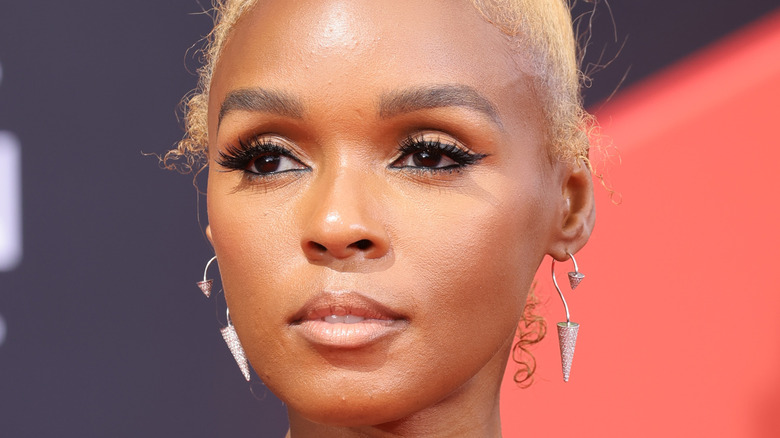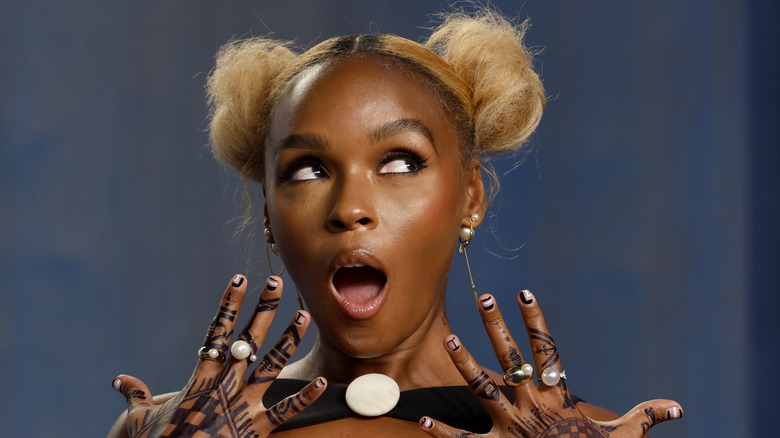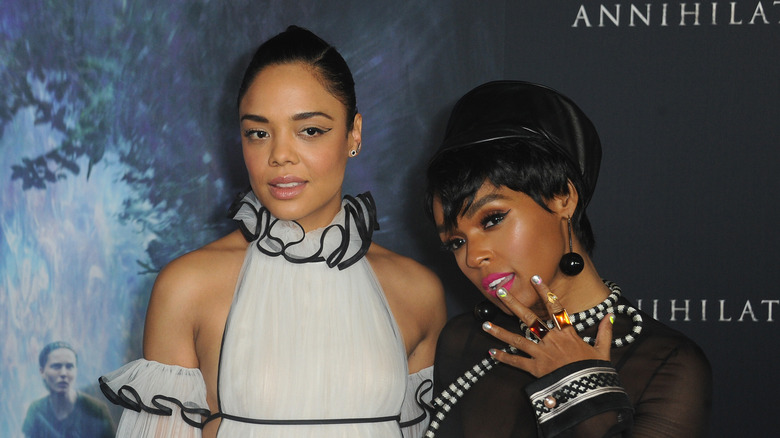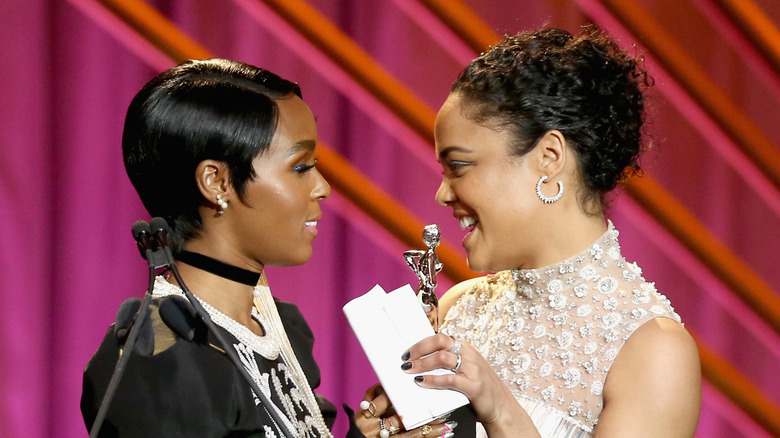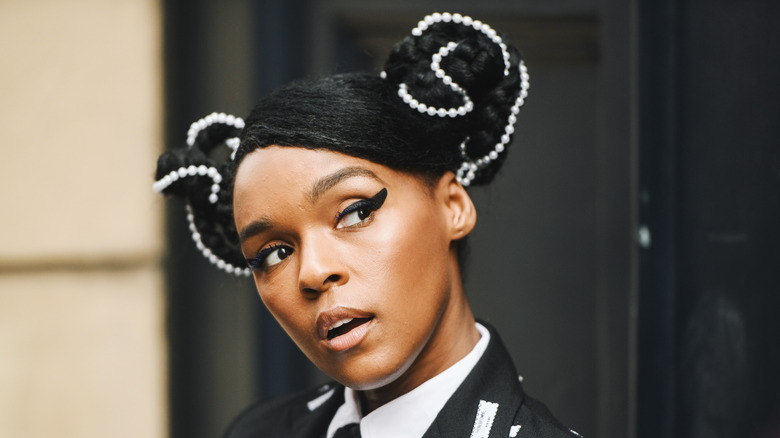The Truth About Janelle Monae's Sexuality
Janelle Monáe's career has undergone a stunning transformation including multiple albums, award-winning films, and becoming the CEO of her own label, per Rolling Stone, but the performer seems to have endless creative reserves to offer adoring fans for years to come. The artist has utilized a unique blend of Afro-futurism in her album concepts, which includes her debut "The ArchAndroid," sophomore smash "Electric Lady," and her most recent venture, "Dirty Computer," which also included a visual album that Monáe dubbed an emotion picture (via YouTube).
Monáe has long been admired by fans who craved a less conventional singer-songwriter model, and her distinct style has been influenced by previous mold-breakers like her friend Stevie Wonder, Prince, who served as her mentor, and superstar David Bowie, according to her interview with Rolling Stone. Monáe has carved a niche for herself as an artist who experimented with varied gender representation and whose lyrics spoke to an audience who considered themselves to be different from those around them.
When discussing "Dirty Computer," Monáe shared with Rolling Stone, "All I saw was that I was supposed to look a certain way coming into this industry, and I felt like I [didn't] look like a stereotypical black female artist." Because of this, she was initially nervous about opening up to the world. However, in 2018, she shared her truth, and admirers can hold onto her music as a testament to the power of self-acceptance.
The singer's album Dirty Computer was a major turning point
When Janelle Monáe spoke with Rolling Stone in 2018, she clarified how she came to understand her own journey with sexuality. She had originally considered herself bisexual, telling the outlet that she is "someone who has been in relationships with both men and women," she later found a term that better described her experience. "I read about pansexuality and was like, 'Oh, these are things that I identify with too.' I'm open to learning more about who I am."
Monáe confirmed for fans that their intuition had led them in the right direction if they had a feeling about Monáe's sexual preferences. "If you listen to my albums, it's there," she explained, even telling the outlet that the original title of the song "Q.U.E.E.N." was "Q.U.E.E.R."
The singer sees herself as a role model for younger queer people who are struggling with their identity or place in the world, a feeling she communicates through her album's motif of androids, machines gone haywire, and the assimilation of dirty computers into a technological society based on conformity (via Rolling Stone). "I want young girls, young boys, nonbinary, gay, straight, queer people who are having a hard time dealing with their sexuality, dealing with feeling ostracized or bullied for just being their unique selves, to know that I see you . . . Be proud." With Monáe's music, it's easy to get into the perfect mood for Pride.
These stars had similar timing in their coming out journeys
One of the other lingering questions surrounding Janelle Monáe's sexuality was her dating life, especially when it came to her close friend and collaborator Tessa Thompson. The pair were first linked when Thompson appeared in Monáe's music video for "Yoga" in 2015, per In Style, and they were also seen together at the MOCA gala. Thompson later starred as Monet's muse in her 2018 visual album for "Dirty Computer," in which the pair popularized Monáe's iconic "vagina pants."
Monáe's interview with Rolling Stone — in which she came out as pansexual — was published in 2018, the same year Thompson interviewed with Net-A-Porter and confirmed her appreciation for the open environment she grew up in when it came to her sexuality. "I can take things for granted because of my family — it's so free and you can be anything that you want to be." She added, "I'm attracted to men and also to women. If I bring a woman home, [or] a man, we don't even have to have the discussion." Though both stars would deal with the pressures of being queer and Black in Hollywood, which Monáe discussed with Rolling Stone, both she and Thompson found a path forward.
The stars value their privacy
Janelle Monáe told the podcast LGBTQ&A in 2022 more about her experience coming out in 2018. "I mean, I knew that this was the time for me," the singer shared. "I'd already talked to the necessary folks and I was at peace . . . I'm still a super private person. I have no interest in releasing who I'm dating or not dating, that's not important."
In Tessa Thompson's 2018 interview with Net-A-Porter, she talked about her relationship with Monáe in somewhat vague terms. "It's tricky, because Janelle and I are just really private people and we're both trying to navigate how you reconcile wanting to have that privacy and space, and also wanting to use your platform and influence."
But the stars share the sentiment that LGBTQIA representation among public figures makes a tangible difference in the cultural landscape as well as individual lives. Thompson explained to Net-A-Porter, "That was something I was conscientious of in terms of this declaration around Janelle and myself. I want everyone else to have that freedom and support that I have from my loved ones . . . But so many people don't. So, do I have a responsibility to talk about that? Do I have a responsibility to say in a public space that this is my person?"
Janelle Monáe's journal with gender is also progressing
In 2022, Janelle Monáe is continuing to learn about her identity and share her discoveries with the world. On Red Table Talk with hosts Jada Pinkett-Smith, Willow Smith, and Adrienne Banfield-Norris, the star opened up about her journey with gender. "I'm nonbinary, so I just don't see myself as a woman, solely. I feel all of my energy."
That same week, Monáe spoke to the Los Angeles Times while promoting her new memoir, "The Memory Librarian And Other Stories of Dirty Computer" before the Times' Festival of Books. She announced, "My pronouns are free-a** motherf*****— and they/them, her/she."
The author also shared on Red Table Talk, "I will always, always stand with women. I will always stand with Black women. But I just see everything that I am beyond the binary. When I see people, I see your energy first — I don't see how you identify — and I feel like that opens you up to fall in love with any beautiful spirit."
